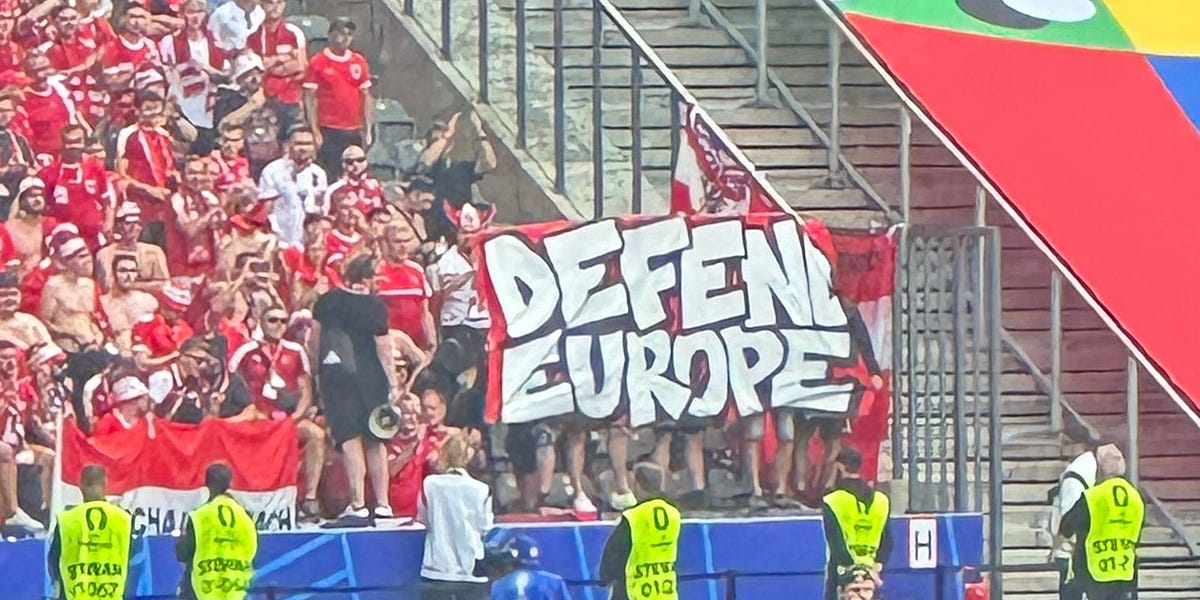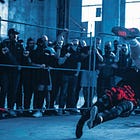Welcome to Sports Politika, a newsletter and media platform focused on the intersection of sports, power and politics. This newsletter was founded by investigative journalist and researcher Karim Zidan and relies on the support of readers.
If you have not done so already, please consider becoming a paid subscriber.
In 1999, Italian DJ Gigi D’Agostino produced L’Amour Toujours—a techno anthem that became a hit in the international club scene . Two decades later, however, the song has sparked outrage and bans after being coopted by right-wing extremists.
The use of L’Amour Toujours by the far right started in late 2023, when a video surfaced of a group singing a variation of the song where they replaced the lyrics with “Ausländer raus” (foreigners out) in a nightclub in Dortmund, Germany. In May 2024, a group of wealthy partygoers were filmed singing the same song at an outdoor bar in Kampen. One guest mimicked the Nazi salute, while a young black woman was reportedly assaulted.
Since then, other extremist renditions of L’Amour Toujours have been heard across Germany, most recently during the 2024 European Championships.
On Thursday, June 20, Hungarian fans were filmed signing the extremist rendition in the Euro 2024 fan zone in Stuttgart. Hungarian ultras were also pictured carrying a “Free Gigi” banner, referring to D’Agostino and his now blacklisted anthem.
These extremist renditions of L’Amour Toujours, which continue to be heard at Euro 2024, are among the many examples of far-right incidents that have taken place since the start of the tournament.
During the group stage match between Poland and Austria at Berlin Olympic Stadium on June 21, a group of Austrian fans raised a “Defend Europe” banner. The phrase is an anti-immigrant and anti-Islam rallying cry for the ultranationalist pan-European Identitarian extremist network.
The movement promotes conspiracy theories such as the Great Replacement, which claims that European populations are being demographically and culturally replaced by non-white peoples—especially from Muslim-majority countries—through mass migration.
The sentiment was shared by a group of England supporters who posed outside a pub in Frankfurt with the Union Jack flag carrying the caption “Stop the boats”.
There are plenty of other examples of far-right presence at Euro 2024: Prior to a match against Denmark, Slovenian fans were pictured with a black flag emblazoned with a Celtic cross—a prominent far-right symbol—at the fan zone in Stuttgart; Hungarian fans showed off an “anti-ANTIFA” banner and anti-LGBTQ+ posters; Ukrainian fans displayed the flag of the Third Assault Brigade, an offshoot of the far-right Azov Regiment led by extremist politician Andriy Biletsky; Turkish fans were spotted giving the so-called “wolf salute” of the right-wing extremist group “Grey Wolves.”
These ultranationalist incidents are not exclusive to Euro 2024. However, against the backdrop of rising far-right tides across Europe, including in the European Union’s recent parliamentary elections, Euro 2024 has proven to be a microcosm of Europe’s overall ails.
Take the current Balkan controversy. Euro 2024 happens to be the first time that Serbia, Albania and Croatia have appeared in the same senior finals. This, in turn, has led to a plethora of incidents stemming from the simmering tensions in the region. At one point, Serbia threatened to pull out of the tournament if Croatia and Albania were not punished for apparent hate chanting from the stands, including chants that reportedly called for the killing of Serbs.
The hateful chants are also coming from players. Albanian forward Mirlind Daku led his country in chants of “fuck Macedonia” and “fuck Serbs” into a megaphone after his team salvaged a 2-2 draw against Croatia. UEFA opened an investigation into his actions and he later apologized.
Meanwhile, Serbian fans displayed various ultranationalist flags and symbols during their group stage games, including a banner showing neighbouring Kosovo as part of their territory, along with the words “We do not surrender.” (Kosovo’s football federation later filed an official complaint to UEFA, adding that it “threatened the fragile security of the region)
Serbian fans also clashed with police in Munich ahead of a match against Denmark on June 25, resulting in a handful of arrests. Serbian fans reportedly raised Russian flags and chanted Russian president Vladimir Putin’s name. Some Serbian fans reportedly chanted “Kosovo is Serbia.”
While UEFA has stepped in to investigate some of the incidents stemming from Balkan supporters, it has taken little interest in the extremist banners from the identitarian movement and other ultranationalist groups. This is a grave error on the governing body’s part, as it is this confluence of far-right xenophobia and extremism that is has become the battlecry of football’s most extreme fanatics.
Many of the hooligans and extremists spouting hate during Euro 2024 are part of a growing network of far-right groups that are uniting under pan-European and anti-democratic ideals. Many of them are connected to neo-Nazi groups around the world, including the Active Clubs that I have investigated for the past few years.
Among those celebrating the hateful banners and slogans are the extremist hooligan and ultras groups popular on alternative social media networks like Telegram. One group recently shared side-by-side pictures of the French national team from 1984 and 2024, the latter of which featured a diverse team filled with players of African descent.
The caption read: “Stop the replacement of European peoples.”
Sports Politika is a newsletter about the intersection of sports, power and politics. If you like what you see, upgrade to a paid subscription ( or gift a subscription if you already have your own). We would appreciate if you could also like the post and let us know what you think in the comment section below.



